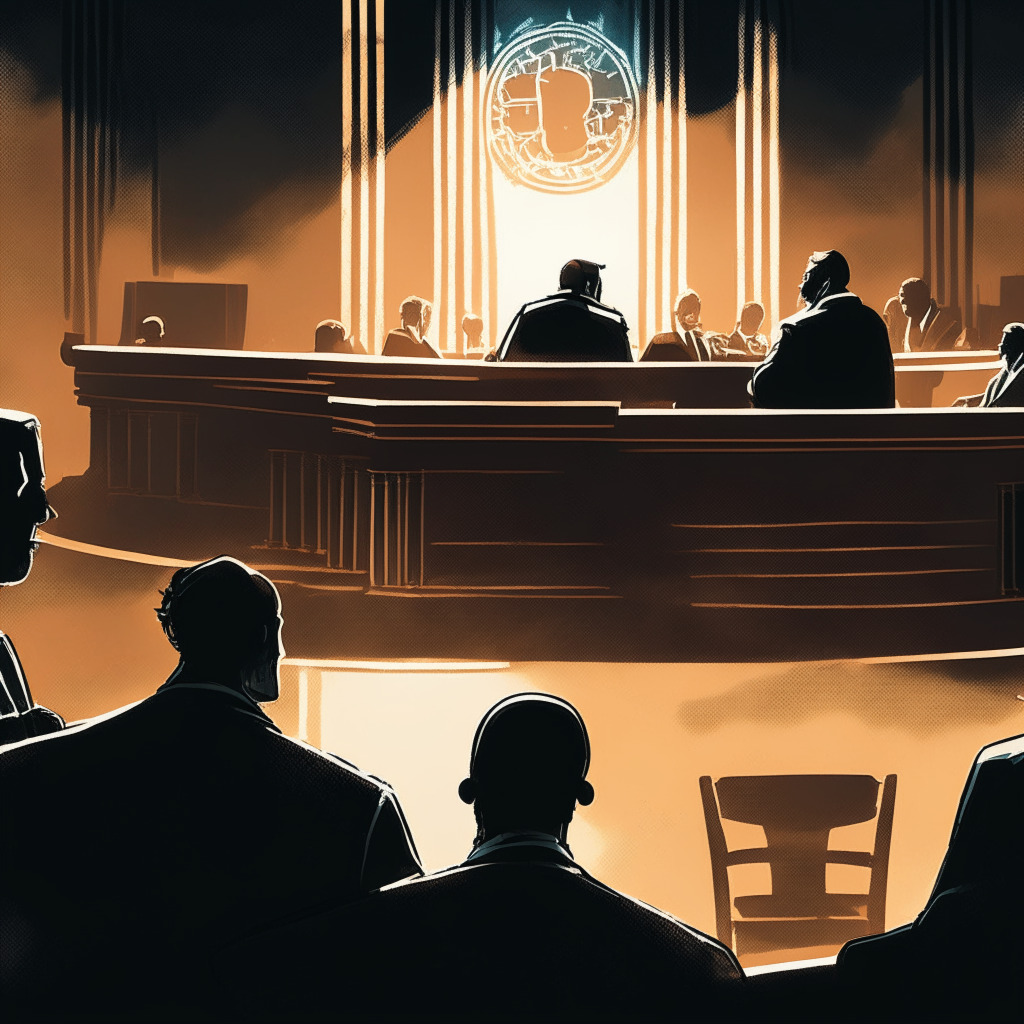Binance.US has criticized a ‘compel and reply’ motion by the SEC, calling it overly arduous and unreasonable. The SEC’s demand for details from Binance’s top executives has been countered, arguing that these executives don’t have exclusive knowledge regarding the topics exploring in the consent order. The ongoing situation intensifies the friction between regulatory bodies and crypto institutions on the scope of information demanded and the legitimacy to serve such demands.
Search Results for: Gary
Riding the Crypto Rollercoaster: Navigating the Bitcoin Crash Amid Regulatory Changes
In the constantly fluctuating cryptocurrency landscape, Bitcoin’s trading value has decreased significantly, influenced by big players or ‘whales’ offloading their stocks. With looming regulation tightening, exchanges like Luno are making adjustments to comply. It’s critical to stay informed and back your investments with thorough research and professional insight in this volatile market.
Expert Battle in FTX Founder’s Legal War: Implications on Future Cryptocurrency Regulation
“In the case involving FTX Founder Sam Bankman-Fried, the DOJ argues proposed defense witnesses lack necessary expertise. The defense’s proposed expert witnesses, however, cover a range of expertise, from data analytics to law and may challenge DOJ’s testimonies, if needed. The case raises questions about law enforcement’s future interference in cryptocurrency matters.”
Crypto Regulation: Is Gensler’s Staunch SEC Stance Justified or Not?
“SEC Chair, Gary Gensler, asserts that crypto assets are securities to be regulated by the SEC, despite recent legal disputes. He believes most crypto assets meet the Howey Test, a legal criterion determining if an asset is a security. Crypto companies and courts debate the future direction of crypto regulation.”
Clash of Titans: SEC’s Gensler’s Crypto Apprehensions and the Ongoing Crypto-securities Law Drama
U.S. Securities and Exchange Commission Chair, Gary Gensler, stands firm on his belief that most crypto tokens likely qualify as investment contracts under the law, making them subject to securities laws. Despite recent court decisions favoring crypto entities like Ripple, Gensler remains focussed on the noncompliance of the crypto sector with these laws, fuelling ongoing crypto-securities law conflicts.
Unraveling the Billion-Dollar FTX Bankruptcy: Hidden Assets, Fraud Allegations, and Possible Crypto Market Impact
The bankrupt crypto exchange FTX revealed $7 billion assets including $1.16 billion in SOL tokens and $560 million in Bitcoin. This, alongside $2.2 billion in assets secured by executives prior to bankruptcy, has raised controversy. The company seeks to liquidate crypto holdings to settle creditors.
Diving into the SEC-Ripple Legal Strife: Future of XRP at Stake Amid Regulatory Uncertainties
Amid the ongoing lawsuit against Ripple Labs by the US Securities and Exchange Commission (SEC), the crypto community faces uncertainty about the future of XRP. The SEC’s appeal plea, centered around the Howey Test’s application to digital assets like XRP, has intensified concerns. Presently, as the value of XRP is scrutinized, the growing success of Wall Street Memes’ currency, $WSM, offers a reminder of the varied opportunities in the crypto ecosystem.
Ripple vs SEC: Hypocrisy vs Urgency in the Battle for Crypto Regulation
Ripple’s Chief Legal Officer, Stuart Alderoty, criticizes the SEC’s inconsistent approach to enforcing crypto regulations, hinting at a potential power struggle within the SEC. This legal conflict between Ripple and the SEC may significantly shape the future of the global crypto space.
Balancing Act: Evaluating the Call for Limited SEC Oversight in Cryptocurrency Regulation
Congressman Tom Emmer plans to introduce an amendment to minimize SEC’s crypto oversight, highlighting overreach by chairman Gary Gensler. Emmer emphasizes the need to cease enforcing funds for digital assets until clear regulations are defined, reducing unnecessary compliance burdens and promoting innovation. However, the lack of concrete crypto regulation poses risks and challenges. Balancing regulation and protection of investors’ interests is paramount in propelling the crypto realm forward.
SEC vs Ripple Labs: A Twisted Tale of Cryptocurrency Regulations and Legal Ambiguity
“In a recent development, the U.S. SEC has challenged the court’s previous decision that XRP was not a security when sold to retail investors. However, the SEC’s move has been critiqued as contradictory, considering past statements by the agency asserting the sufficiency of existing crypto regulations. The case’s outcome could significantly impact the crypto market.”
Navigating the US Crypto Regulatory Hurdles: Will Clarity Emerge or Companies Relocate?
The United States’ unclear crypto regulations are driving companies to seek more crypto-friendly countries. Tennessee Senator, Bill Hagerty, supports comprehensive cryptocurrency legislation in the US, replacing the current ‘regulation by enforcement’. He also highlights risks in the unrestricted adoption of Central Bank Digital Currencies (CBDCs).
Reshaping America’s Financial Future: The Digital Dollar Dilemma and Road to CBDC Regulation
The House Financial Services Committee is preparing to discuss the implications and regulation of a digital dollar or Central Bank Digital Currencies (CBDCs), along with private sector alternatives. This conversation, following various states erecting legislative boundaries for CBDCs and $41 million hacking of a crypto site, underlines the need for balance between innovation and robust regulatory frameworks.
FTX Saga: A Look into Big Finance, Politics, and Blockchain Intersection
“The indictment against FTX’s founder, Sam Bankman-Fried, for alleged violation of campaign finance laws and connections to a multibillion-dollar fraud gains momentum as key figures, including Ryan Salame, plead guilty. This saga highlights the intersection of finance, politics, and blockchain, shedding light on the potential misuse of this potent mix and prompting questions regarding customer safeguarding and innovation enhancement.”
Navigating Regulatory Hurdles: CFTC Member Advocates for Cryptocurrency Pilot Program
CFTC’s Caroline Pham advocates for a pilot program to oversee cryptocurrencies, aiming to stimulate the growth of digital asset markets. Besides facing resistance from current CFTC leadership, the crypto industry’s future is uncertain due to regulatory skepticism and Congress bills’ fate.
Crypto Innovation Versus Regulation: The Hagerty-Gensler Faceoff
Sen. Bill Hagerty critiques SEC Chair Gary Gensler’s stance towards crypto, stating it stifles innovation and drives potential investors and companies overseas. He advocates for basic stablecoin regulations instead of comprehensive measures to improve the environment for U.S. crypto operations.
Blockchain Regulation: The FTX Case’s Impact on Future of Cryptocurrency Innovation & Accountability
“The FTX case suggests a turning point for blockchain transparency and ignites concerns about cryptocurrency enterprises’ organization. It could inspire stricter controls within such companies, but it might also deter potential innovators due to intense regulatory pressures.”
European Digital Euro: An Unhurried Approach to Future Financial Stability
Mairead McGuinness, European Commissioner for Financial Stability emphasizes cautious approach to digital euro implementation. As cash loses popularity and commerce digitalizes, a future with digital central bank public money is anticipated. The transition could massively impact cross-border payments and global financial sectors, hence the need for careful scrutiny.
The US: Falling Behind In The Blockchain Race? Evaluating Current Policies and Ambitions
Chris Larsen, Ripple Labs’ Chair, criticized the current Biden administration’s approach to cryptocurrency policy, suggesting its ambiguity has caused confusion within the sector. Larsen also argued that current policies push the industry offshore, naming Dubai, Singapore, and London as emerging global blockchain capitals. Meanwhile, the race for the first US spot Ethereum ETF is heating up.
Pushing the Boundaries: Grayscale Urges SEC for Speedy Bitcoin ETF Approval Amid Rising Crypto Investments
Cryptocurrency investment manager Grayscale has petitioned the U.S. Securities and Exchange Commission (SEC) to expedite the conversion of Grayscale Bitcoin Trust (GBTC) into a Bitcoin exchange-traded fund (ETF). This follows a court reversal of a previous rejection of GBTC’s ETF bid, causing Grayscale to argue there’s no justifiable cause to deny their ETF application.
Cryptocurrency Regulation: An Autocratic Approach or the Need of the Hour?
The SEC’s potential favoritism towards traditional banking applications from BlackRock and Fidelity has raised concerns. Following the recent Grayscale case, comments from legal expert Felix Shipkevich suggest the SEC’s controversial regulation methods may unduly affect smaller crypto institutions while benefiting larger firms.
Financial Misconduct Scandal at Crypto Exchange FTX: Ripple Effect on the Crypto Industry
“Recent filings at the United States Bankruptcy Court indicate financial irregularities at crypto exchange FTX. Documents suggest misuse of company funds by executives, with transactions aimed to enrich the top brass at FTX and Alameda Research.”
Two Key Paradigm Executives Step Down Amid Regulatory Standoff with SEC
“Paradigm’s CFO and General Counsel are set to step down, with Chief Legal Officer, Katie Biber, taking the legal reins. The firm challenges the SEC’s authority to regulate secondary crypto markets and advocates for penalizing companies that haven’t complied with existing regulations. This brings a needed discussion on crypto regulatory ambiguity to the forefront.”
Robinhood’s $605.7M Share Reclaim: Unraveling The Complex Tale of Bankruptcy and Legal Challenges
Robinhood’s $605.7 million share buyback agreement reclaims shares seized by the US government amid FTX’s bankruptcy—a move linked to SBF’s legal challenges and potential market shifts. It also underscores the intertwined nature of corporate separations, bankruptcy, and legal challenges in the crypto sector.
Robinhood’s Bold Move: Acquiring 55 Million Apprehended Shares from Former FTX CEO
“Cryptocurrency trading platform, Robinhood, acquires over 55 million shares, previously held by ex-FTX CEO, Sam Bankman-Fried, for about $606 million. The purchase, already approved by Robinhood’s board, extends shareholder base and consolidates control but raises potential future legal complications.”
Robinhood’s Controversial Stock Buyback: The Future of Crypto Regulation or threat to Decentralization?
“The share repurchase agreement that Robinhood has recently agreed with the U.S. Marshal Service might have ramifications on government control in cryptocurrency. While this agreement could offer more investor protection and market longevity, critics worry about potential disruption to the principles of cryptocurrencies – primarily decentralization and immunity from governmental manipulation.”
SEC Delays Bitcoin ETF Decision: Opportunity or Obstacle for Crypto Growth?
The U.S. SEC has delayed a decision on spot bitcoin ETF applications until October, causing a halt in the progression of cryptocurrency values. Meanwhile, ether and bitcoin were classified as “commodities” in a New York court ruling dismissing a lawsuit against Uniswap.
Habitual Delays on Bitcoin ETFs: The SEC’s Calculated Cautious Approach and its Impact on the Crypto Future
“The U.S. SEC has delayed decisions on Bitcoin ETF applications from several firms, requiring another 45 days minimum for further investigation. This triggers concerns about a longer wait for Bitcoin ETF authorizations, possibly as late as 2024.”
SEC Delays Bitcoin ETF Decisions: Cautious Maneuvers or Hindrance to Crypto Progress?
The U.S. Securities and Exchange Commission (SEC) recently extended the review period for Bitcoin ETF applications from six companies by 45 days, stirring anticipation in the crypto community. This move typifies the SEC’s consistent, cautious approach to digital assets, often resulting in procedural delays.
Court Ruling Throws Crypto Sphere into Disarray: ETH and BTC as Commodity vs Security
A New York district court dismissed a lawsuit against Uniswap, ruling that BTC and ETH are commodities, not securities. The court defended the decentralized nature of Uniswap, stating the investors’ claims would be better addressed to Congress, not the court. This ruling may influence future lawsuits against decentralized protocols.
Second Chance for US Crypto Regulations: A Comparative Study of Global Trends
“The US digital asset industry may revive as courts counter the perceived hostility of the authorities. Digital asset lawyer, Jeremy McLaughlin, suggests recent cases weakening SEC’s argument might spark industry resurgence. However, he noted the challenges of such contentious landscape.”
Crypto Commodities: Bitcoin and Ether and their Legal Status in US Courts
U.S. District Court Judge Katherine Polk Failla recently referred to Ether and Bitcoin as “crypto commodities,” dismissing a lawsuit against decentralized exchange Uniswap. The legal classifications of cryptocurrencies continue to vary, with other digital currencies such as XRP classified as a security. Amidst conflicting views, U.S. lawmakers are yet to determine whether SEC or the CFTC will have authority over digital assets. Specialists suggest these legal classifications are crucial for creating a more organized and regulated crypto environment.
SEC’s Crypto Regulation Approach: A Stepping Stone or Stumbling Block?
Gary Gensler, the SEC Chairman, is facing criticism from lawmakers for his aggressive stance on crypto regulation lacking transparency. The SEC’s focus on enforcement and penalties, absent clear guidelines on crypto assets within its jurisdiction, has come under scrutiny. Furthermore, differing views on regulatory approach, particularly regarding potential links between Prometheum and Chinese entities, have led to questioning of the SEC’s approval procedures. As Gensler prepares to return to Capitol Hill, debates on cryptocurrency policy will intensify, with calls for a cohesive, clear, routine for regulating this sector.































